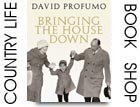Book Review: Bringing the House Down: A Family Memoir
Hugh Massingberd is enthralled by David Profumo's humorous and affectionate portrayal of a loving family who survived a media storm.


Exquisite houses, the beauty of Nature, and how to get the most from your life, straight to your inbox.
You are now subscribed
Your newsletter sign-up was successful
Bringing the House Down: A Family Memoir, David Profumo (John Murray, £20)
As avid readers of his fishing column in Country Life will not need to be told, David Profumo is an outstandingly witty, stylish and original writer. In this bracingly honest and frequently sparkling family memoir, he has really excelled himself. Indeed, I would not hesitate to describe Bringing the House Down as a masterpiece.
This refreshingly readable book is so much more than a study of the sensational events of 1963?the so-called 'Profumo Affair', when David's father, John Profumo, Secretary of State for War, resigned from the Macmillan Government, but did not, as the cliché claims, bring it down.
The author's 'principal aim is to explain who my parents were when they met, and how (partly for my sake) they stayed together, despite a liaison exposed in full limelight, and its intense afterburn'.
The affair that really concerns him is 'their love affair, which endured, in however adulterated a form, for the rest of their lives together'. Disarmingly, he does not aspire to 'set the record straight' and owns up to being 'almost entirely subjective'. In short, he brilliantly exemplifies George Bernard Shaw's maxim: 'If you cannot get rid of the family skeleton, you may as well make it dance'.
Shall We Dance? was one of the hit numbers in the musical The King and I, the last stage appearance of the actress Valerie Hobson before she settled down to married life with Jack Profumo. As their son reminds us, at the time of their marriage in 1954, it was his mother who was the more celebrated of the two?her numerous successful films had included Bride of Frankenstein, Great Expectations and Kind Hearts and Coronets.
A key point of the book is to restore the author's mother to centre-stage?as her son writes: 'Her professional achievements have been so marginalised that she has been consigned to a walk-on role in the brief, but more lurid, saga on which the world's media has understandably chosen to fix'. In a letter to her son about the affair, she reflected of her husband: 'He got himself into such a frightful mess because he was shocked beyond endurance by the thought of telling me'.
Exquisite houses, the beauty of Nature, and how to get the most from your life, straight to your inbox.
The author wonders whether one reason why his father 'so brazenly denied any misbehaviour with Miss Keeler was that he was on some kind of final warning from my mother, and he could not bear the thought of losing her'. Such sympathetic understanding of human nature shows up humbugs such as the ghastly George Wigg, a Labour politician who harped on about the non-existent 'security aspect' of the affair. (As an authorial parenthesis points out, Wigg was later charged with kerb-crawling.)
Astonishingly, the author himself was kept in ignorance about the 'Profumo Affair' until he arrived at Eton in 1968, where an odious boy known as 'the Butcher' told him: 'Well, there were these two tarts?'
Subsequently, he was nicknamed 'Keeloid', and there was no escape. On his travels in India, a desert guide, on hearing his name, croaked: 'Ah, Christine Keeler!' Yet, somehow, he managed to keep the sense of humour which illuminates this book. Of the tawdry film Scandal, he remarks that the part of his father was 'played by a famously homosexual actor in a toupee of almost taxidermal implausibility'. Piscatorial metaphor is invoked for the fishnet meshes of Stephen Ward's 'pimping net'. And when his father returned to 11, Downing Street in 2004 to receive an award for his decades of charity work, the author cannot resist reporting the hilarious paternal announcement to the policeman: 'Oh dear, I am afraid my pants are falling down'.
Country Life is unlike any other magazine: the only glossy weekly on the newsstand and the only magazine that has been guest-edited by His Majesty The King not once, but twice. It is a celebration of modern rural life and all its diverse joys and pleasures — that was first published in Queen Victoria's Diamond Jubilee year. Our eclectic mixture of witty and informative content — from the most up-to-date property news and commentary and a coveted glimpse inside some of the UK's best houses and gardens, to gardening, the arts and interior design, written by experts in their field — still cannot be found in print or online, anywhere else.
